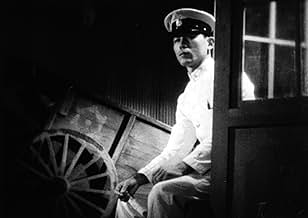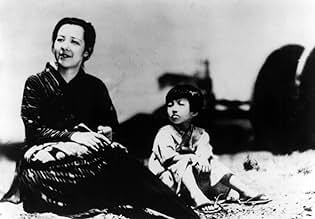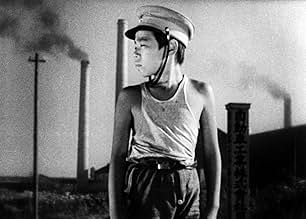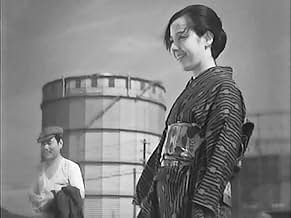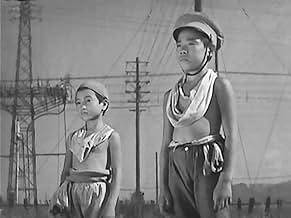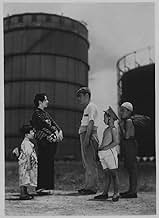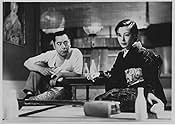Tôkyô no yado
- 1935
- 1h 19min
CALIFICACIÓN DE IMDb
7.4/10
1.8 k
TU CALIFICACIÓN
Kihachi, desempleado, y con dos hijos, intenta llegar a fin de mes con dificultad. Pero las dificultades no impiden que intente cortejar a la madre soltera Otaka.Kihachi, desempleado, y con dos hijos, intenta llegar a fin de mes con dificultad. Pero las dificultades no impiden que intente cortejar a la madre soltera Otaka.Kihachi, desempleado, y con dos hijos, intenta llegar a fin de mes con dificultad. Pero las dificultades no impiden que intente cortejar a la madre soltera Otaka.
- Dirección
- Guionistas
- Elenco
- Dirección
- Guionistas
- Todo el elenco y el equipo
- Producción, taquilla y más en IMDbPro
Opiniones destacadas
This early great work from The Master is a sobering melodrama honed squarely on a single unemployed, homeless father struggling to feed and shelter his two sons. Ozu does a fine job capturing the dynamic between the two boys by themselves and with their father, but the film really gets interesting when two women enter the story: a young single mother, also homeless, and an old friend who finds the father a job. The maudlin climax seems to anticipate Ford's GRAPES OF WRATH and DeSican melodrama -- though in the wrong ways -- but prior to that Ozu comes up with an quirky expressionist sequence to reflect the father's unraveling moral state.
Ozu was really on the verge of discovery at the time, having experimented for a few years. I believe this is why he continued in the silent format longer than his peers, fearing sound would pose demands on the visual experience he was hoping to cultivate. So he was looking for an eye that is quiet but attentive, alert, seeing with a kind of vital emptiness.
Focus would be his exercise. In place of more rigorous form, he had discovered a few motifs he knew carried resonance - vast rolling skies, floating weeds, fireworks - and was content to use that as spontaneous blossoms of insight amid languid flows.
And he had an optimism that was touching, faith in a secular way. His characters really grew to a point of sublime selflessness but did so out of common sense and remained distraught, human.
So there is a lot of sense in early Ozu, in both meanings of the word, and this is why I value him.
But I wish he was bolder at the same time. And this is because the first 30 minutes are unusually sparse, even by standards he was developing, and just look at how simply he paints contemporary Japan with one stroke, a father with two raggedy kids to feed, unemployed in the middle of a sunbaked plain littered with factories, but in the latter stages turns into conventional drama that resolves theatrically, and even worse is a rehash of his Floating Weeds from the previous year.
So he was finding ways to handle emptiness but was still thinking in terms of balanced, old-fashioned storytelling. His eye was looking to see clearly but did not see itself.
The juxtaposition is striking and disappoints more, especially by comparison to the likes of Mizoguchi and Naruse who were coming up with clever ways to annotate the artifice of their melodrama. Ozu's unfolds at face value, provincial in its earnestness.
Asymmetry is what is lacking here. Imbalance that reflects a world unfettered by narratives.
Focus would be his exercise. In place of more rigorous form, he had discovered a few motifs he knew carried resonance - vast rolling skies, floating weeds, fireworks - and was content to use that as spontaneous blossoms of insight amid languid flows.
And he had an optimism that was touching, faith in a secular way. His characters really grew to a point of sublime selflessness but did so out of common sense and remained distraught, human.
So there is a lot of sense in early Ozu, in both meanings of the word, and this is why I value him.
But I wish he was bolder at the same time. And this is because the first 30 minutes are unusually sparse, even by standards he was developing, and just look at how simply he paints contemporary Japan with one stroke, a father with two raggedy kids to feed, unemployed in the middle of a sunbaked plain littered with factories, but in the latter stages turns into conventional drama that resolves theatrically, and even worse is a rehash of his Floating Weeds from the previous year.
So he was finding ways to handle emptiness but was still thinking in terms of balanced, old-fashioned storytelling. His eye was looking to see clearly but did not see itself.
The juxtaposition is striking and disappoints more, especially by comparison to the likes of Mizoguchi and Naruse who were coming up with clever ways to annotate the artifice of their melodrama. Ozu's unfolds at face value, provincial in its earnestness.
Asymmetry is what is lacking here. Imbalance that reflects a world unfettered by narratives.
This film deals with an unemployed man and his two sons who rover through the industrial areas of Tokyo during the depression in the search for work.
After some bad luck the father is able to find a job but then the pity for a single mother and her sick little daughter makes him do something he should not have done.
This is the very simple story but this is not what makes the film a masterpiece. The great achievement is that Ozu shows how poverty affects the human mind. He depicts the fear and the feeling of senselessness in a way that nobody else has ever done. Many of the devices him employs are very imaginative. Many people might compare this film to de Sica's "Ladri di biciclette" which was made 12 years later. But without doing a disservice to de Sica's masterpiece: "Tokyo no yado" is the best film that was ever made about poverty and unemployment,
After some bad luck the father is able to find a job but then the pity for a single mother and her sick little daughter makes him do something he should not have done.
This is the very simple story but this is not what makes the film a masterpiece. The great achievement is that Ozu shows how poverty affects the human mind. He depicts the fear and the feeling of senselessness in a way that nobody else has ever done. Many of the devices him employs are very imaginative. Many people might compare this film to de Sica's "Ladri di biciclette" which was made 12 years later. But without doing a disservice to de Sica's masterpiece: "Tokyo no yado" is the best film that was ever made about poverty and unemployment,
An Inn in Tokyo follows Kihachi, a nearly penniless, wandering laborer, as he and his two young sons, Zenko and Shoko, search through the industrial wastelands of Tokyo, hoping for any work to sustain them. For three days, their efforts are fruitless, leaving them weary and hungry. Along the way, they meet Otaka, a widowed mother with her own little girl, Kimiko. Similarly struggling, the two families form a bond, united by their hardship and loneliness in this desolate landscape.
Eventually, Kihachi encounters an old friend, Otsune, who runs a small café. She offers Kihachi a job, and for the first time in days, he finds a brief sense of relief and joy. However, Kihachi soon learns that Kimiko has fallen seriously ill with dysentery, leaving her mother unable to pay the hospital fees. Desperate to help, Kihachi attempts to borrow from Otsune, but when she cannot lend the money, he makes the painful choice to steal from a wealthy bar. He gives the stolen money to Otaka for her daughter's care, sacrificing his own freedom in the process.
In a poignant final act, Kihachi asks Otsune to care for his sons, then walks alone to the police station to surrender. His oldest son, aware of the sorrow weighing on his father, serves him an imaginary cup of sake, a brief and tender gesture of understanding that underlines the deep connection between them.
This was Ozu's penultimate silent film, and it serves as a precursor to Italian neorealism, blending stunning technical precision with a powerful exploration of human resilience. Set against the bleak, industrial sprawl of Tokyo, Ozu presents the heartbreaking plight of two lost adults and their children, highlighting social hardship while masterfully capturing fleeting moments of humor and humanity. The film's compassionate performances, especially by the children, enrich this landscape, imbuing it with life and depth.
Eventually, Kihachi encounters an old friend, Otsune, who runs a small café. She offers Kihachi a job, and for the first time in days, he finds a brief sense of relief and joy. However, Kihachi soon learns that Kimiko has fallen seriously ill with dysentery, leaving her mother unable to pay the hospital fees. Desperate to help, Kihachi attempts to borrow from Otsune, but when she cannot lend the money, he makes the painful choice to steal from a wealthy bar. He gives the stolen money to Otaka for her daughter's care, sacrificing his own freedom in the process.
In a poignant final act, Kihachi asks Otsune to care for his sons, then walks alone to the police station to surrender. His oldest son, aware of the sorrow weighing on his father, serves him an imaginary cup of sake, a brief and tender gesture of understanding that underlines the deep connection between them.
This was Ozu's penultimate silent film, and it serves as a precursor to Italian neorealism, blending stunning technical precision with a powerful exploration of human resilience. Set against the bleak, industrial sprawl of Tokyo, Ozu presents the heartbreaking plight of two lost adults and their children, highlighting social hardship while masterfully capturing fleeting moments of humor and humanity. The film's compassionate performances, especially by the children, enrich this landscape, imbuing it with life and depth.
Ozu's final surviving silent film (College is a Nice Place seems to be both silent and lost), An Inn in Tokyo feels more like a return to socially conscious filmmaking from the Japanese director, more bluntly dealing with poverty as a central motif than he had in A Story of Floating Weeds where the poverty felt more situational and tied to character. Ultimately, the film ends up working very well, but An Inn in Tokyo kind of feels like Ozu taking a step backwards, trying to be timely rather than pursuing his own stories.
The second movie featuring the character Kihachi (Takeshi Sakamoto) who first appeared in Ozu's Passing Fancy, the story is about the single dad trying to find work while penniless and in charge of his two boys, Zenko (Tokkan Kozo) and Masako (Takayuki Suematsu). He can work a lathe, but no one will hire him, and the family of three have to choose whether to sleep in a field and eat or to sleep in the titular inn and not eat every night in order to save what little money they have. When Zenko spends a chunk of their remaining cash on a hat for himself, their dire situation is made all the worse. And Kihachi can't get mad. They're just kids. It's not their fault. He's responsible for them, and it's his fault that they're having to choose between food and a roof over their heads, with dwindling resources every day.
They're joined by Otaka (Yoshiko Okada) and her daughter Kimiko (Kazuko Ojima), another parent/child impoverished pair who wander the fields of the industrial area outside of Tokyo. Kihachi's salvation, though, comes from an old friend, Otsune (Choko Iida), who owns a small tea shop and can provide him and his boys (and quickly thereafter Otaka and her girl) with a place to sleep and some food.
What's interesting about the character journey here is that it's a realization on the part of Kihachi that...he shouldn't be a father. He can't take care of his own children, and he makes all of the wrong decisions to the point where he decides that his kids are better off being raised by someone else. It's the sort of realization that hurts once it comes, but come it does.
The path is around Otaka disappearing for a while when she gets a job, Kihachi taking it quite badly, and Kihachi, gotten a job through Otsune's influence, deciding that he needs to take drastic measures to help Otaka when she reveals that Kimiko is having health problems.
His string of decisions leads to that quiet ending where Kihachi has to reflect on what he's become, looking mournfully at people he's betraying to do what he thinks is right, and making his big choice about his family's future. That Kihachi has been so well-drawn, the situation so well established, and the supporting characters so well integrated that there's real emotional weight to those final moments. It's an accomplished ending that actually does move me.
I just feel like the opening is kind of heavy-handed with the portrait of poverty. Which is a contrast to A Story of Floating Weeds where the poverty felt so easily integrated, even while the portrait of the acting troupe's poverty was so instrumental to the drama of the story working out. Maybe it's simply a factor of how long Ozu wallows in the poverty at the beginning of An Inn in Tokyo. There's little else for the first twenty minutes or so. There are far fewer characters and far fewer things for the characters we do have to do (the deal with the hat essentially gets repeated when Zenko and Masako argue over carrying a bag, just leaving it on the road and walking away as their solution).
So, the opening is drawn out and slightly repetitive, but at the halfway point, Ozu brings things into the proper gear and moves along at the right pace to get us to the emotional climax. It's almost like he didn't quite have enough story idea and his cowriters (Masao Arata and Tadao Ikeda) didn't know how to fill that opening act with enough material. Still, the overall package has the right kind of punch, a very good way for Ozu to say goodbye to the silent period (again, minus College is a Nice Place).
Still, he's been aching for the sound period for a while. Characters really need to speak. It's time.
The second movie featuring the character Kihachi (Takeshi Sakamoto) who first appeared in Ozu's Passing Fancy, the story is about the single dad trying to find work while penniless and in charge of his two boys, Zenko (Tokkan Kozo) and Masako (Takayuki Suematsu). He can work a lathe, but no one will hire him, and the family of three have to choose whether to sleep in a field and eat or to sleep in the titular inn and not eat every night in order to save what little money they have. When Zenko spends a chunk of their remaining cash on a hat for himself, their dire situation is made all the worse. And Kihachi can't get mad. They're just kids. It's not their fault. He's responsible for them, and it's his fault that they're having to choose between food and a roof over their heads, with dwindling resources every day.
They're joined by Otaka (Yoshiko Okada) and her daughter Kimiko (Kazuko Ojima), another parent/child impoverished pair who wander the fields of the industrial area outside of Tokyo. Kihachi's salvation, though, comes from an old friend, Otsune (Choko Iida), who owns a small tea shop and can provide him and his boys (and quickly thereafter Otaka and her girl) with a place to sleep and some food.
What's interesting about the character journey here is that it's a realization on the part of Kihachi that...he shouldn't be a father. He can't take care of his own children, and he makes all of the wrong decisions to the point where he decides that his kids are better off being raised by someone else. It's the sort of realization that hurts once it comes, but come it does.
The path is around Otaka disappearing for a while when she gets a job, Kihachi taking it quite badly, and Kihachi, gotten a job through Otsune's influence, deciding that he needs to take drastic measures to help Otaka when she reveals that Kimiko is having health problems.
His string of decisions leads to that quiet ending where Kihachi has to reflect on what he's become, looking mournfully at people he's betraying to do what he thinks is right, and making his big choice about his family's future. That Kihachi has been so well-drawn, the situation so well established, and the supporting characters so well integrated that there's real emotional weight to those final moments. It's an accomplished ending that actually does move me.
I just feel like the opening is kind of heavy-handed with the portrait of poverty. Which is a contrast to A Story of Floating Weeds where the poverty felt so easily integrated, even while the portrait of the acting troupe's poverty was so instrumental to the drama of the story working out. Maybe it's simply a factor of how long Ozu wallows in the poverty at the beginning of An Inn in Tokyo. There's little else for the first twenty minutes or so. There are far fewer characters and far fewer things for the characters we do have to do (the deal with the hat essentially gets repeated when Zenko and Masako argue over carrying a bag, just leaving it on the road and walking away as their solution).
So, the opening is drawn out and slightly repetitive, but at the halfway point, Ozu brings things into the proper gear and moves along at the right pace to get us to the emotional climax. It's almost like he didn't quite have enough story idea and his cowriters (Masao Arata and Tadao Ikeda) didn't know how to fill that opening act with enough material. Still, the overall package has the right kind of punch, a very good way for Ozu to say goodbye to the silent period (again, minus College is a Nice Place).
Still, he's been aching for the sound period for a while. Characters really need to speak. It's time.
¿Sabías que…?
- TriviaThe credits indicate that the script was based on an original work by a foreign writer with a name that sounds like "Winzart Monet", but it is actually a gag name, derived from "without money".
- ConexionesFeatured in A Story of Children and Film (2013)
Selecciones populares
Inicia sesión para calificar y agrega a la lista de videos para obtener recomendaciones personalizadas
Detalles
- Tiempo de ejecución
- 1h 19min(79 min)
- Color
- Mezcla de sonido
- Relación de aspecto
- 1.37 : 1
Contribuir a esta página
Sugiere una edición o agrega el contenido que falta

